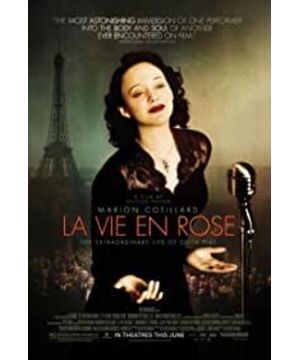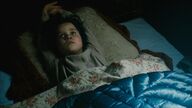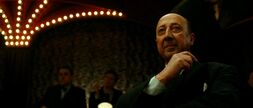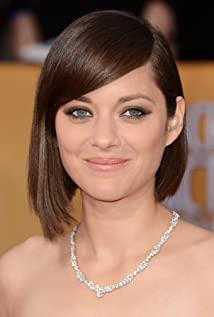It's not necessarily an objective rating, after all, it's a rating from watching the snow until 5:40 in the morning, and it's also a rating that is bewitched by the magic of a long time.
The reason I like this movie is the same as the reason I like "Ruan Lingyu". They both mix one's fate with one's fate, until they can no longer be separated: a life that is constantly lost.
Edith's life is a life of constant loss of love, from Titina, from Monina, from Marcel. But every time those heavy makeup can't cover up the sparkle in the eyes, every time those laughter or rage can't cover up the caring panic, it's a life that keeps losing the love but can't help but continue to love.
For her, music was like a life-saving straw, making her "valuable", giving her a place to escape, and finally letting her try to stand up again before she fell. In any case, what I like the most is that, for artists and ordinary people, in the end, I have to return to the relationship between people and to fall in love. The world of Chanson is so delightful, it draws thunderous applause and tears, it's a place where one can temporarily forget the tragic nature of life, and Edith's only sense of security.
But we can feel that those who are not good to her are just like the last song, but they have nothing at the end, and more importantly, their faces are so vague and identical that they will not leave a deeper memory in the memory. 's nicks. What left the scars was her fear, fear of losing Marcel, fear of disappointment, fear of loneliness. But if these fears are feared, there will be no memories worth keeping, Marcel's smile, the joy of the audience, the thoughts of friends, and the Japanese doll that her father gave her in pity. Just as her biggest pain was revealed at the end of the film, the body of the blindfolded little daughter. This is also the biggest experience I have experienced recently. Sometimes even if the consciousness wants to remember, the body will help you forget it, so that you can have the possibility to love again. So, I think as a biopic, the director has at least stepped into Edith's world. Even if he didn't know enough about Edith's world, he did know his own and people's worlds seriously.
Fear of love. In the end, when love dissipates, fear dissipates, but life also dissipates. After all, "We are happiest when death takes us away."
View more about La Vie En Rose reviews










